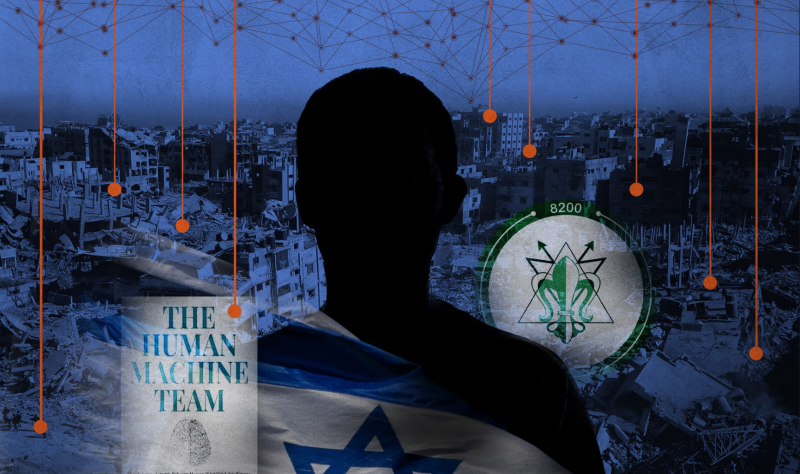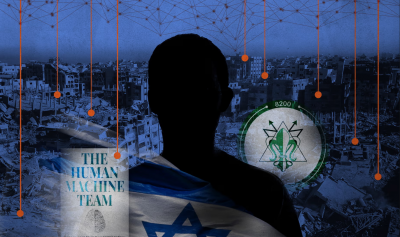An investigation by the British "Guardian" revealed that the identity of Israeli intelligence unit 8200 leader Yossi Saryel was exposed due to an online security breach. The newspaper noted that Saryel left a digital trace of his identity after publishing an electronic version of a book on Amazon. It highlighted that he holds one of the most sensitive roles in the military, leading one of the most powerful surveillance agencies in the world, akin to the U.S. National Security Agency.
After spending over two decades operating in the shadows, the Guardian was able to disclose how Saryel, a controversial intelligence head, revealed his identity online. The embarrassing security lapse is linked to a book he published on Amazon, which left a digital footprint of a Google account created under his name, along with links to account maps and calendar profiles. The Guardian confirmed through multiple sources that Saryel is the secret author of the book "The Human Machine Team," which offers a radical vision of how artificial intelligence is transforming the relationship between military personnel and machines.
Published in 2021 under a pseudonym made up of the initials of his name, Colonel YS, the book outlines advanced AI systems that the Israeli Defense Forces pioneered during the six-month war in Gaza. The electronic version of the book included an untraceable email address that could easily be traced back to Saryel's name and Google account. An Israeli army spokesperson stated that the email address was not Saryel's personal address but was "specifically dedicated to issues related to the book itself."
This security mistake is likely to increase pressure on Saryel, who is said to "live and breathe" intelligence work, although his tenure in charge of the IDF's electronic intelligence division has become mired in controversy. Unit 8200, once highly respected both inside Israel and beyond for its intelligence capabilities rivaling those of the UK's Government Communications Headquarters (GCHQ), is believed to have built a vast surveillance apparatus to closely monitor Palestinian territories. However, it has faced criticism for failing to foresee and prevent the deadly Hamas attack on October 7 of last year, in which Palestinian militants killed nearly 1,200 Israelis and kidnapped around 240.
Since the Hamas-led attacks, there have been accusations that the "technological arrogance" of unit 8200 came at the expense of traditional intelligence-gathering techniques. During the war in Gaza, the IDF appeared to fully adopt Saryel's vision for the future, with military technology representing new frontiers where AI is utilized to accomplish increasingly complex tasks on the battlefield.
In his book published three years ago, Saryel argued that his ideas on using machine learning to transform modern warfare should become mainstream. He wrote: "We just need to take them from the sidelines and deliver them to the center stage." One section of the book heralds the concept of an AI-powered "targeting machine," whose descriptions closely resemble target recommendation systems that the IDF is now known to rely upon in its bombing of Gaza.
Over the past six months, the IDF has unveiled several AI-driven decision support systems that have rapidly been developed and refined by unit 8200 under Saryel's leadership. These include the Gospel and Lavender systems, both target recommendation systems revealed in reports by the Israeli-Palestinian magazine +972, its Hebrew outlet Local Call, and the Guardian. The Israeli army states that its AI systems aim to assist human intelligence officers, who are tasked with verifying that military suspects are legitimate targets under international law.
On Wednesday, +972 and Local Call messages highlighted the connection between unit 8200 and the book mysteriously authored by Colonel "YS." It is understood that Saryel wrote the book with the Israeli army's permission after spending a year as a visiting researcher at the National Defense University in Washington, D.C., where he presented the case for using AI to transform modern warfare. The book targets high-ranking military leaders and security officials, illustrating the concept of "human-machine collaboration" that seeks to achieve synergy between humans and AI, rather than building entirely independent systems.
It reflects Saryel's ambition to become a "thought leader," according to a former intelligence official. In the early 2000s, he was a leading member of a group of academically inclined spies known as "the choir," which advocated for reforms in Israeli intelligence practices. In the book, Saryel refers to the "revolution" that has occurred in recent years within the IDF, which "developed a new concept of warfare focused on intelligence to link intelligence with fighters in the field." He calls for the full integration of intelligence and warfare, especially when conducting lethal targeting operations.
In one chapter, he proposes a model for how to build an effective targeting machine based on "big data" that the human mind cannot process. He writes: "The machine needs enough data regarding the battlefield, the population, visual information, cellular data, social media communications, images, and mobile phone contacts. The more data and diversity, the better." He argues that this targeting machine would rely on complex models to make predictions based on "many small and varied features," giving examples like "people who are with a Hezbollah member in a WhatsApp group, people who get new mobile phones every day, and those who change addresses frequently."
He states that using AI to create potential military targets could be more efficient and avoid "bottlenecks" caused by intelligence officials or soldiers. "There is a human bottleneck concerning identifying new targets and making the decision to approve targets. There is also a bottleneck associated with how to process large amounts of data. Then there is the bottleneck of linking intelligence information to fire.” He adds, "a team composed of machines and investigators can open the bottleneck wide."
The disclosure of Saryel's security breach comes at a difficult time for the head of intelligence. In February, he faced public scrutiny in Israel when the Israeli newspaper Maariv published a report on mutual accusations within unit 8200 following the October 7 attacks. Saryel was not named in the article, which referred to the 8200 unit leader only as "Y". However, the rare public criticisms highlighted a divide within the Israeli intelligence community regarding the greatest failure in a generation.
The report indicated that Saryel's critics believe that prioritizing "addictive and exciting" technology over traditional intelligence methods led to the disaster. A veteran official told the newspaper that the unit led by Saryel "followed the new intelligence bubble." For his part, Saryel was quoted telling his colleagues that the day of October 7 "will haunt him" until his last day. He said: "I bear responsibility for what happened in the deepest sense of the word. We were defeated. I was defeated."




